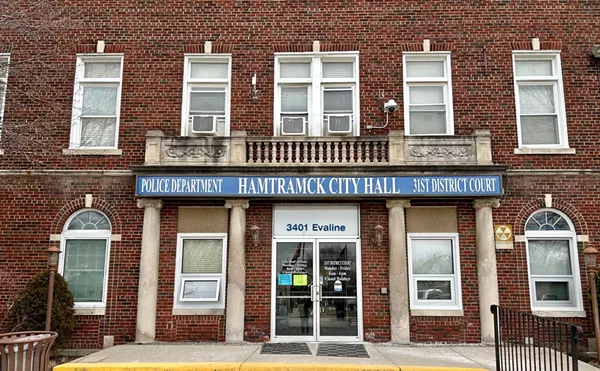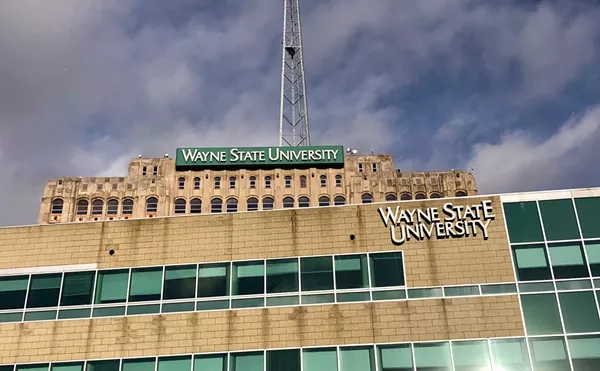
Audio By Carbonatix
[
{
"name": "GPT - Leaderboard - Inline - Content",
"component": "35519556",
"insertPoint": "5th",
"startingPoint": "3",
"requiredCountToDisplay": "3",
"maxInsertions": 100,
"adList": [
{
"adPreset": "LeaderboardInline"
}
]
}
]
The facts couldn't be more starkly clear. Unless Congress bails out General Motors with a massive loan sometime in the next six weeks, the giant corporation will likely go bankrupt.
That may well lead to a ripple effect that will doom Ford Motor Co. and Chrysler too, not that Chrysler really has any long-term prospects, other than as part of some other company.
It's almost impossible to overstate how serious a blow that would be to all of us. The nonprofit Ann Arbor-based Center for Automotive Research (CAR) did a study of what that might mean.
According to Sean McAlinden, CAR's chief economist, the near-instant loss of almost 3 million jobs nationwide could occur if all three automakers go under. More of those jobs would be in Michigan than anywhere else. What if only one company were to fail, i.e., GM? The numbers would still be catastrophic — maybe close to 2 million jobs.
Why so many? Why couldn't General Motors declare bankruptcy, say, and then use that breathing space to reorganize? Other companies — the airlines, for example — have done that, and have come back strong. Or at least sort of strong.
The difference is simple — and twofold.
First, other companies don't sell products that cost five figures and need lots of parts and maintenance over years and years. How willing are you going to be to fork over $25,000 for a car or a truck if you don't know whether there will still be a company there to honor the terms of your warranty?
Let's say the auto companies can address that concern. Here's a second, bigger problem: General Motors is in deep doo-doo, primarily because it is running out of cash to pay its parts suppliers. And nobody is buying cars right now thanks to the credit crunch.
For once, that isn't the auto industry's fault. General Motors is now burning cash at the rate of about $3 million an hour. Sometime in January, it is projected to run short.
Many of GM's suppliers run on a very tight margin. As I understand it, if General Motors doesn't pay them, they can't pay their workers and buy their supplies. This may put them out of business too. Trouble is, many of them also supply parts to Ford and Chrysler. That's where the potential domino effect comes in.
Naturally, the auto industry is looking to Washington for help. This fall, Congress voted $700 billion for bailouts for the financial services sector. The guys at CAR are not simply car buffs, by the way; they are hardheaded economists with Ph.D.s.
McAlinden told me that a bridge loan of $15 billion might enable the automakers to hang on till the new administration and new Congress can come in and start working on a long-term policy.
Incredibly, Congress is balking at using less than 5 percent of the bailout money to save this crucial manufacturing sector of our economy. That is, the Republicans in the current lame-duck session are the ones trying to do us in. Despite his party having been smeared in this month's elections, U.S. Sen. Richard Shelby of Alabama basically said Detroit could go impregnate itself.
"The financial problem facing the Big Three is not a national problem, but their problem. The legacy of the uncompetitive structure of its manufacturing and labor force," he said.
What that really means is that he hates unions; his state voted overwhelmingly against President-elect Obama; and he couldn't care less about what happens to any goddamn Dee-troit.
In recent days, the Detroit media have been rallying around what The New York Times recently called the "Sorry Three," with boosterish and sometimes whiny journalism like the column Susan Tompor had on the front page of last Sunday's Free Press. ("Where's love for our city?" it plaintively asked Washington.)
When Gannett took over the Freep it removed "Detroit" from the title of the Sunday edition. But even that company understands that if these automakers fail, we all go down.
It would be extremely foolish from the standpoint of the nation's economy to let General Motors crash and burn — and yes, it would even cost jobs in far-off Alabama. That's an inconvenient truth Richard Shelby and his fellow primitives ought to realize. Yet we've got some very unpleasant truths to face ourselves. To a great extent the automakers brought a lot of this on themselves, though decades of corporate arrogance and sloppiness.
Case in point: Twenty years ago, I had a beautiful Buick Century, which I scrupulously maintained, and which had electrical and engine problems so severe nobody could fix them. I had a 1984 Oldsmobile station wagon, which died after about 75,000 miles. Then I moved to Tennessee and bought a Honda Accord. The quality of that car, and of the attitude of those who serviced it, was so far superior to anything Detroit made or did I decided I was done with Detroit cars for life.
These days, the experts admit it's more or less true that foreign automakers outperformed us back then, but add that the quality of our domestic vehicles has drastically improved. Yet the closest I have gotten to buying a domestic car is a Volvo, which is at least owned by Ford.
There are millions of people who can tell you similar stories, which is a good part of the reason the Big Three are in the shape that they are. (If you want to know more about the pigheadedness of the Detroit auto titans, read David Halberstam's book The Reckoning.)
Nor do I see evidence these companies are being run very well, even now. Yesterday, I got a letter from a highly intelligent information technology specialist who works for Chrysler. Let's call him "Boris." He documented a history of stupid abuses and inefficiencies, and demonstrated that "information technology outsourcing, presented as the way to save money, actually costs Chrysler many millions every month and destroys its business."
Has he pointed this out to those in power? Ironically, he says, "In my previous life in the former Soviet Union, I was sort of more free to talk my disagreements with management."
That doesn't mean Boris is against saving them, and Michigan's economy, but he argues that "any kind of help to the Big Three should be accompanied by very strict conditions attached."
Amen to that! What's more, General Motors should at least be forced to broom the crew of nitwits who have led them into the ditch.
Massive restructuring is needed, but the patient first has to be stabilized, by any means necessary. Otherwise, we will be looking at something very like the Great Depression.
If it is all the same to you ... I would rather not.
Corruption and the river crossing? I have written before about Gregg Ward, the plucky owner of the Detroit-Windsor Truck Ferry, which takes trucks carrying oversized loads across the river. They aren't supposed to use the Ambassador Bridge unless they pay the city $200 in permit fees, partly to compensate for grinding the streets into rubble. But Ward, who offers the bridge some puny competition, says trucks do anyway — and get away with not paying.
He produced some documentation that indicated this was so, as well as an e-mail from Saul Green, Detroit's new deputy mayor, who said he would look into it. Stay tuned.
Jack Lessenberry opines weekly for Metro Times. Contact him at letters@metrotimes.com




